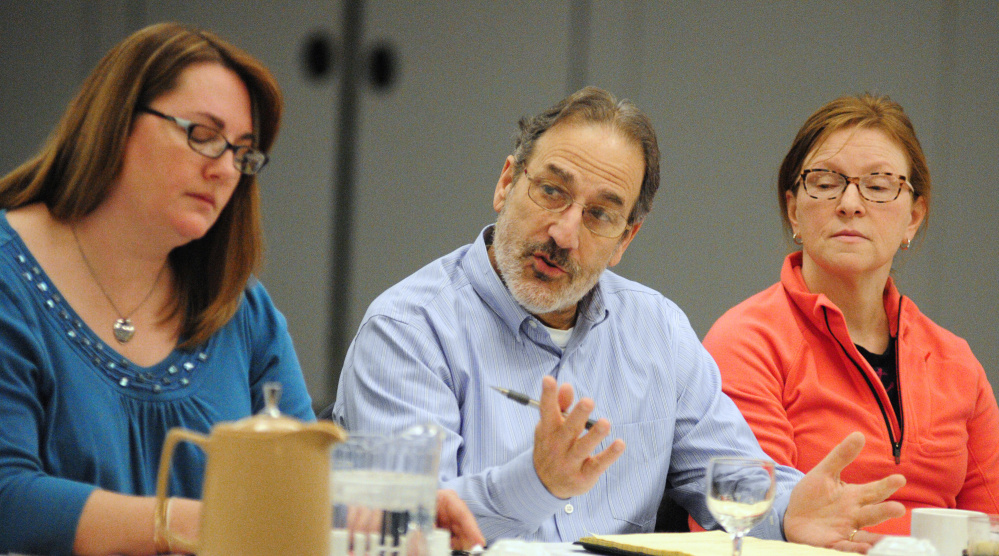AUGUSTA — While an influx of immigrant students who need help learning English is expected to require about $216,000 more in school funding next year, city officials said the growing number of immigrant families coming to Augusta is not creating a major burden for city taxpayers.
During a discussion between the school board and city councilors Monday night about the proposed $29.6 million school budget, Superintendent James Anastasio said the number of students requiring English-language learner programming has climbed from 90 at the start of the school year to about 140 now.
That influx of students, many of whom are the children of immigrants from Iraq, Afghanistan and Syria who have moved to Augusta recently, prompted the need to hire two new teachers, four new educational technicians and one interpreter, all to work with the city’s English-language learner students, for a total of about $216,000.
Anastasio said about 6 percent of students in Augusta’s public schools are English-language learners, and 22 languages are spoken by Augusta students. School officials said many of the students are new to learning English, and thus currently at low levels of proficiency with the language.
“They’re certainly a positive in our school district. It’s just that the education they deserve is expensive at this point,” Anastasio said.
City Manager William Bridgeo, while sympathetic to the need to add staff to help educate the new students, said overall the city’s burgeoning population of immigrants has not cost the city a lot of extra money.
He said the city’s General Assistance office determined that out of the city’s more than 100 open cases of families or individuals receiving General Assistance, commonly called welfare, only 11 were families or individuals who are immigrants.
“I don’t think the public appreciates this, so if there is a perception in the community we’re being overwhelmed — and I understand (the School Department) may be feeling somewhat overwhelmed, having the challenge of over 140 kids — but from a community perspective, I don’t see the burden on General Assistance, on welfare,” Bridgeo said. “The other thing we’re seeing, statistically, is when folks from these parts of the world show up and end up on General Assistance, they’re not there that long. It’s five, six, seven months till somebody gets a job and gets on their feet.”
At-Large City Councilor Corey Wilson noted having students who speak 22 languages in Augusta schools and learning English can bring positive long-term benefits to both those students and the rest of Augusta.
“Think about when all 22 grow up though, and they own homes in Augusta, and have good-paying jobs here, because of their education,” Wilson said. “We’re investing in our future.”
The budget approved by the school board in March was $280,000 greater than the one Anastasio had presented initially.
The school budget also is subject to approval by the City Council as part of the overall $59.7 million budget for the city, schools and Augusta’s share of the Kennebec County budget.
While some councilors suggested Monday they probably will be looking to find ways to cut the budget, as proposed by Bridgeo it would require a property tax increase of 5.23 percent.
That figure doesn’t include about $140,000 put back into the school budget, which Bridgeo did not include in his recommended budget he turned over recently to city councilors for their deliberation.
“I was uncomfortable recommending to the council a property tax increase that had more than 2 percent of it attributable to new school spending,” Bridgeo said.
Kim Martin, chairwoman of the school board, said the board put some staff positions back into its budget after learning that Augusta’s projected state aid could be about $150,000 more than Anastasio had projected in his initial budget. They included a second nurse for Cony High School, with a cost of $70,000; a security guard also at Cony, at $27,000; three elementary-level teachers, at $110,000; an educational technician, at $13,000; and staff for Project Pride at Farrington and Gilbert elementary schools, at $81,000.
“The board felt we needed to maintain as many of those positions as possible,” Martin said. “We have some positions and needs in our schools the board felt we really shouldn’t be doing without.”
Anastasio, asked by Wilson what cuts he’d recommend if city councilors directed the schools to cut $500,000 from the budget, said administrators would recommend the same list of cuts they recommended before, several of which were put back into the budget by board members.
There is one unexpected area of savings in school spending, however, in insurance costs. Anastasio initially projected the schools’ health insurance costs would increase by 10 percent next year, and included that figure in the budget. However, he said the department received a new projection, on Friday, that insurance costs won’t increase at all next year.
Anastasio said he has not spoken with the board yet about what to do with that potential saving, which could be about $300,000.
Keith Edwards — 621-5647
Twitter: @kedwardskj
Send questions/comments to the editors.



